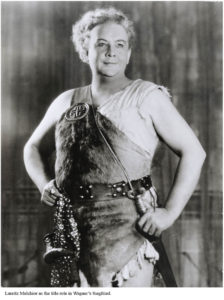
Artist Profile: Lauritz Melchior, THE Heldentenor of the 20th Century
By David SalazarLauritz Melchior remains one of the greatest Wagner tenors ever to perform.
Born on March 20, 1890 in Copenhagen, he was a boy soprano and amateur singer in his youth. However, he would study at the Royal Opera School in Copenhagen and made his professional debut in 1913, as a baritone.
During his time at the Royal Danish Opera, he was but a secondary baritone and bass singer, but things changed when during a performance of “Il Trovatore,” he helped a soprano hit a High C by also interpolating one of his own. This caught the attention of the American contralto , who was the Azucena in the performance. She told him that he was a tenor.
He retrained his voice under Vihelm Herold and on Oct. 8, 1918, he made another debut with the Royal Opera in Copenhagen, this time in “Tannhäuser.”
From there he started performing abroad, earning strong word-of-mouth and eventually, he was invited to sing Siegmund and Parsifal at the Bayreuth Festival for its 1924 re-opening.
In 1924, he debuted at the Royal Opera House, Covent Garden and from there proceeded to make a strong impression in Bayreuth. Per many accounts, his performance of “Parsifal” was attended to by Adolf Hitler and Melchior managed to bring the dictator to tears.
In 1926, he debuted at the Metropolitan Opera. He didn’t make much of an impression upon his debut but by the time he returned in 1929, he became a fixture and performed over 500 times with the company.
Near the end of his career, he appeared in five Hollywood musicals and in the 1960s, he established a fund through the Juilliard School to train other potential heldentenors; the foundation is called The Lauritz Melchior Heldentenor Foundation.
He died on March 19, 1973.
Signature Roles
When people talk about Wagnerian tenors, Melchior is almost always the first that gets brought into any conversation as the gold standard. He was the greatest Wagner tenor of his age and his legacy remains untouched since his heyday.
“As the years go by and no real Heldentenor appears on the scene, the achievement of Melchior in Wagner seems to grow in stature. It is true that in his own era he had several peers, and possibly in his immediate successor, Ludwig Suthaus, a superior in matters of interpretation, but no other Wagnerian tenor quite boxed the compass of the heroic roles so comprehensively,” notes a review of his work in Gramophone.
Read More on Melchoir
What He Had In Common with Beniamino Gigli (Besides A Birthday)
Watch and Listen
Check out the tenor in “Siegfried.”
And here are some assorted recordings.
Categories
Opera Wiki

